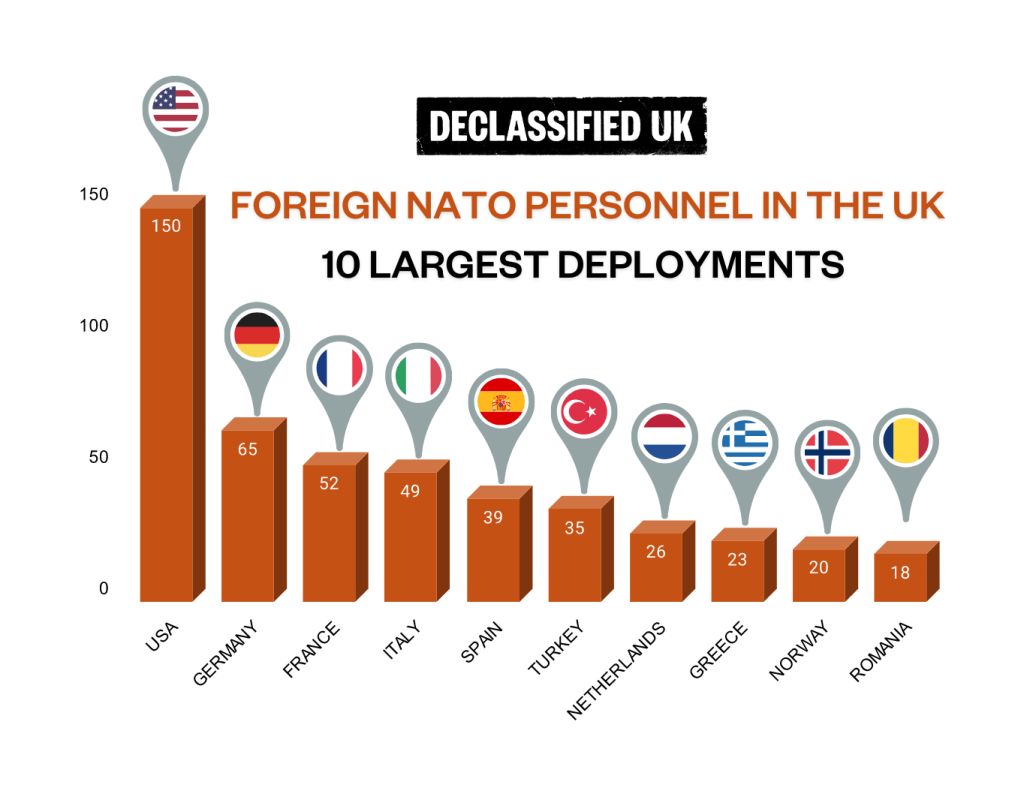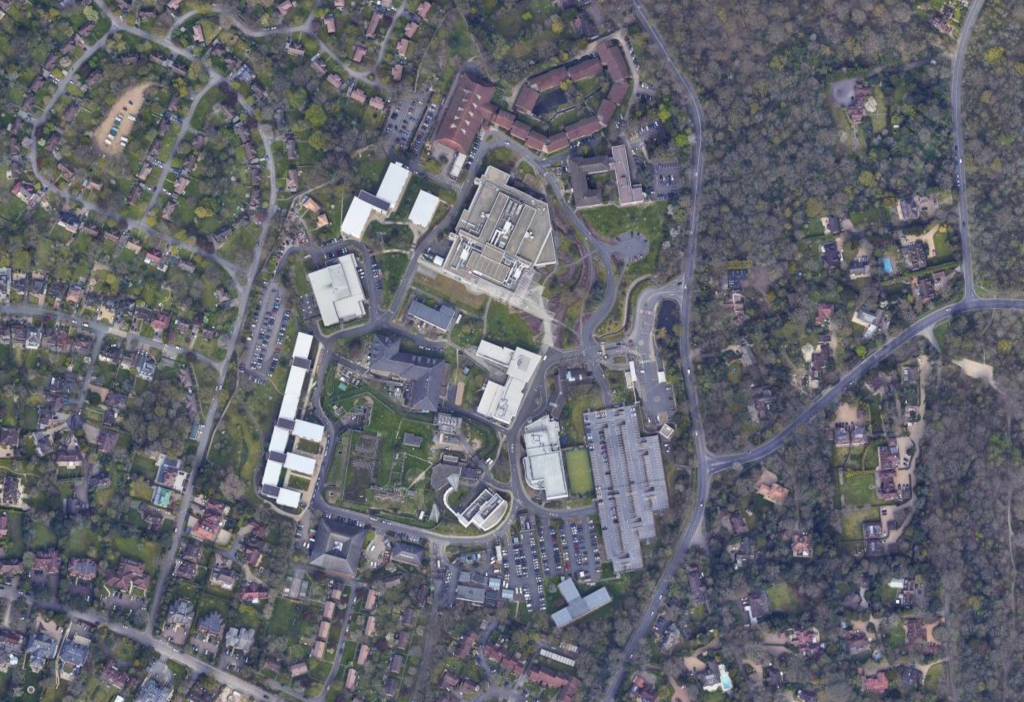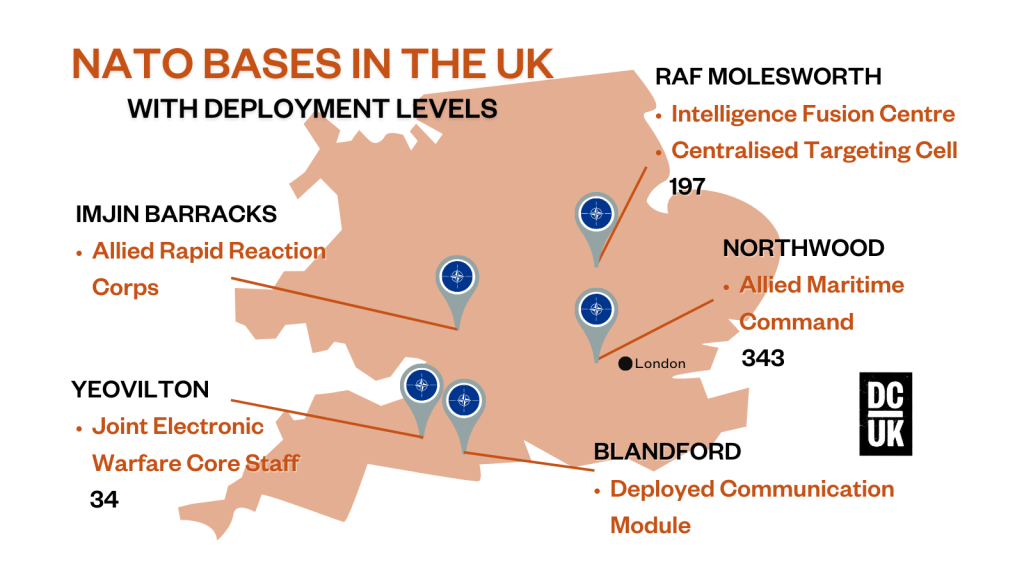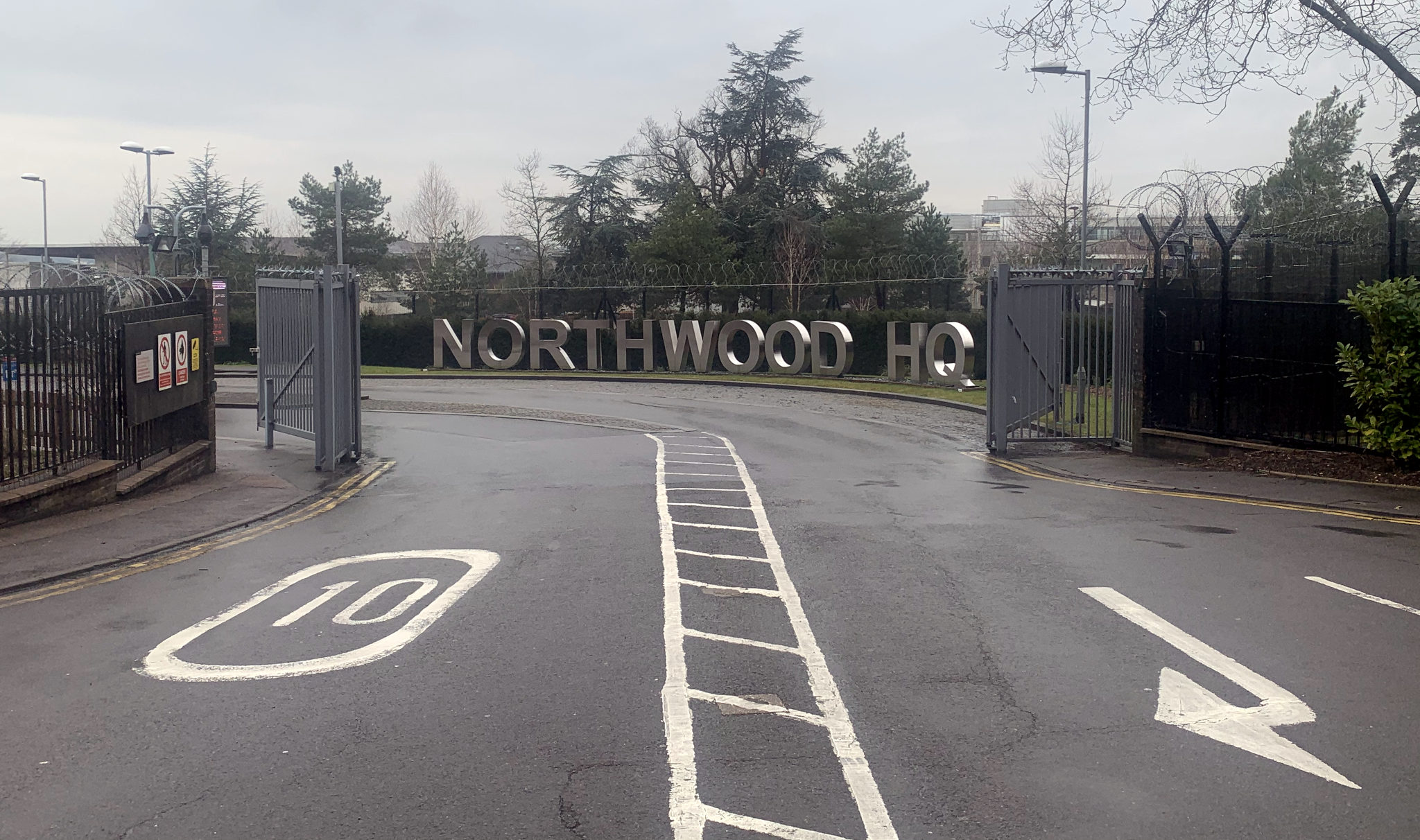As tensions grow between Nato and Russia over Ukraine, Declassified takes a look at the UK’s role in the organisation that Vladimir Putin has blamed for his illegal war.
Some 574 foreign personnel from 29 countries are deployed with Nato across three sites in Britain.
A quarter of them, or 150 personnel, are American with the next highest deployment from Germany with 65.
Turkey, whose armed forces are occupying northern Syria, has 35 military personnel located in Britain with Nato.
Three nations outside the Alliance – Sweden, Austria and Finland – have personnel deployed with Nato at its intelligence centre in Cambridgeshire.
Support for joining Nato in Sweden and Finland – which has a 830-mile border with Russia – is at a historic high after the invasion of Ukraine.
Three personnel from Hungary, whose far-right prime minister Viktor Orbán is an ally of Putin, are also deployed with Nato in Britain.
Meanwhile, the UK has 1,004 military personnel deployed with Nato around the world, including 150 within Britain.
The biggest overseas UK deployment is 238 personnel in Belgium, where Nato is headquartered. Britain also has 192 military personnel deployed with Nato in Italy and 159 in Germany.
The majority of the foreign Nato personnel in the UK are stationed at Northwood Headquarters, a military base in north-west London, which is home to the Alliance’s Maritime Command (Marcom), the central command of all its sea operations.
Although little-known outside military circles, it hosts 342 foreign Nato personnel, including 54 Americans and 52 Germans.
Marcom’s British commander Keith Blount is Nato’s principal maritime adviser and has operational command of its standing naval forces.
Vice Admiral Blout joined the Royal Navy in 1983 and was the Iraqi Maritime Task Group Commander during the invasion in 2003. He was awarded an operational Legion of Merit by President Trump in 2016.
Nato’s Land Command is based in Izmir, Turkey while its Air Command is located in Ramstein, Germany.

Leafy suburb
Nato’s presence at Northwood Headquarters dates back to 1953, four years after the creation of the organisation. When I walk through its gates leading from the street, I’m told quickly there are no photos allowed.
While I wait for an interview that is not forthcoming in the visitor centre, various people come in to enquire about parking space inside the base. “It’s completely full,” the official tells them. “Must be something going on in the world,” jokes one.
The gates leading into the base proper are heavily fortified. A British soldier with a rifle stands in front and there is a perceptible tension in the air. As I walk around outside, the soldier’s eyes, and I assume the ubiquitous CCTV cameras, follow my steps.
The area around the base, however, could not be more different. Northwood is just another quiet, leafy suburb of northwest London, located on the outer reaches of the Metropolitan Line. Many people I stop on the central shopping street are not even aware of the big Nato base up the road.
Rod, a 65-year-old who moved to the area five years ago, does know about it but adds, “I don’t think it is a big part of the local community, they are as cautious as everybody else, they go about their business, those that have reason to connect with them do connect.”
“You very rarely see soldiers around,” he adds, before telling me that foreign soldiers “drive like lunatics, especially Italians”.
But he is happy it is there. “It’s the only thing that stands between us and Putin,” he tells me. “It’s the only thing that stops us and other countries in Europe being overrun by a kleptomaniac who is mad.”

He has little time for locals who worry about if it makes them a threat. “Anyone who goes around questioning whether it’s safe, we don’t want it here, it might make us a bit of a target, well too bloody right, you have to stand up for what you believe in.”
Another local, Mike, 34, is having a coffee outside Costa with a friend. “I do find it scary,” he says, “we’d probably be the first to be nuked, although I’m sure our defences would intercept them before they got anywhere near here.”
But he doesn’t think his concerns are shared by other locals. “I don’t think a lot of people know the base is there actually, I’ve spoken to a few people, I work in Tesco just round the corner, and I don’t think a lot of people are aware, it’s not highlighted…I haven’t heard other people being scared, I’ve just been talking about it with my wife, we both know it’s there, we’re both local”.
His friend, another local, chimes in that she didn’t know about it before I’d asked the question just now.
Mike, who has lived in the area for a decade, says: “It’s not well known about at all even locally, they keep it very low-key, there’s no signs, you see some signs saying Northwood headquarters, that’s the only signs you see.”
He continues: “There’s a big American community, right behind the base, it’s not a military site, it’s just houses where they live.”
Mike doesn’t believe we are “under threat at the moment, but if there’s any retaliation to Russia then I think yeah he’s prepared to use nuclear weapons, I think he’s lost the plot.” Does he feel protected by having the base there or the opposite? “The opposite,” he shoots back.
“A jewel within the Nato intel system”
There are 32 other foreign Nato soldiers based at Royal Naval Air Station Yeovilton in rural Somerset.
Since 2013, it has been the location for Nato’s Joint Electronic Warfare Core Staff (JEWCS) which “offers specialised expertise on how to react to a hostile electromagnetic environment”. It also provides electronic warfare “capabilities” for Nato operations.
Another 28 foreign Nato personnel are based within the organisation’s Centralised Targeting Cell (CTC) at RAF Molesworth in Cambridgeshire. The CTC “provides real-world intelligence support to targeting” for Nato operations and exercises.
RAF Molesworth also hosts the Nato Intelligence Fusion Centre (NIFC) which includes 167 foreign Nato personnel. The centre – which was activated in 2006 with the US as its “framework nation” – provides “timely, relevant, and accurate intelligence in order to support planning and execution of Nato operations”.
US under-secretary of defense for intelligence Ronald Moultrie has said: “Without a doubt, the NIFC is the Nato center of gravity for multinational intelligence collaboration in producing high-impact intelligence for Nato operations.”
Meanwhile, Nato’s maritime commander has called the NIFC “a jewel within the Nato intel system.”

As well as foreign Nato personnel, the British Army’s own 1st Signal Brigade is under the operational command of Nato’s Allied Rapid Reaction Corps.
Based out of Imjin Barracks in Gloucestershire, the high readiness unit specialises in providing information communications systems and logistical support. The brigade is also supported by a Ghurka battalion.
Another UK Army unit permanently assigned to Nato is 280 Signal Squadron, which is based at Blandford Camp in Dorset. Its role is to install and control strategic communication and information systems for Nato deployments.
UK government policy towards Nato is coordinated by the Euro-Atlantic Security Policy Unit, a joint Ministry of Defence and Foreign Office unit established in 2016. The UK currently has 34 people working on engagement with Nato, while the policy team at the UK’s joint delegation to Nato numbers around 50.


